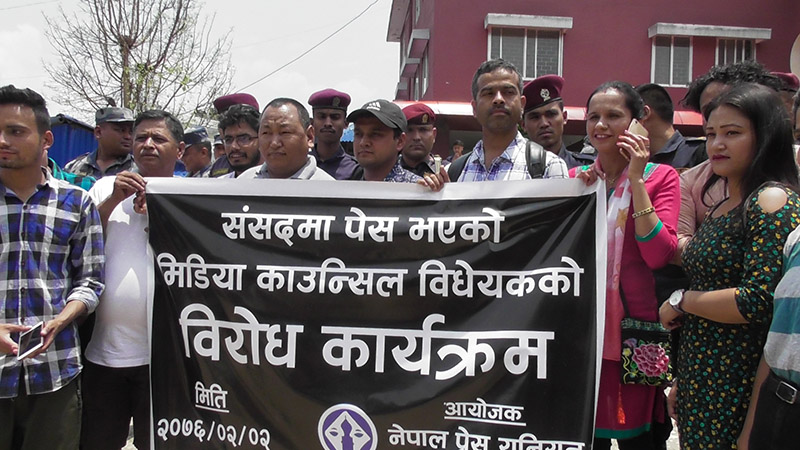Journalists close to NCP suggest amendments
Kathmandu, May 19
Journalists close to the ruling Nepal Communist Party (NCP) today suggested withdrawal of the controversial Media Council Bill from the Parliament and amendment to the provision allowing the council to fine media outlets, editors, publishers and journalists up to Rs 1 million if they are found guilty of damaging someone’s reputation.
Following massive opposition to the bill from all quarters, the NCP had invited a select group of 15 journalists for discussion. A heated debate ensued between journalists and Minister of Communications and Information Technology Gokul Baskota.
Eventually, NCP Parliamentary Party Deputy Leader Subash Chandra Nembang said the bill could be revised following due parliamentary process. He asked journalists to submit a list of points for amendment.
Nembang, Baskota and NCP leaders Yogesh Bhattarai and Pampha Bhusal along with Editor of Drishti Weekly Sambhu Shrestha, former president of Federation of Nepali Journalists Saindra Rai, Gagan Bista, Rajendra Aryal and Bishnu Sapkota, among other journalists attended the discussion.
Most journalists took strong exception to the bill’s penalty provision, stating that the council could not function as a quasi-judicial body. It was only a monitoring mechanism and could not impose fine, penalty or punishment.
“It’s the court that slaps punishments,” said former FNJ President Rai. “This is against the constitution that has guaranteed press freedom in its preamble.” Rai said the government should either withdraw the bill from the Parliament or amend it.
However, Minister Baskota said the government was compelled to put such provisions in place due to the irresponsible activities of journalists. He also said the government would not withdraw the bill.
Rai said Baskota would not hold office forever and that the constitutional provision should be respected. Journalists also said the bill sought to make the council a division of the ministry, which undermined its autonomy. The bill proposes to form a committee under a government secretary to make recommendations to the chairperson of Nepal Media Council, which stakeholders say will turn the council into a branch of the Ministry of Communications and Information Technology.
“The council should be autonomous, not a political recruitment centre,” said Drishti Editor Shrestha. “Press freedom should not be curtailed, it is the heart of democracy.”
In the end, Nembang said there were various good provisions in the bill, and some that needed amendment. He asked journalists to make a list of provisions that needed to be amended. “If there’s anything to be amended, we have to follow due parliamentary process,” Nembang told THT.






